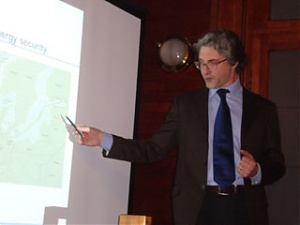Baltic States – CIS, Energy, EU – Baltic States, Forum, Latvia
International Internet Magazine. Baltic States news & analytics
Saturday, 24.05.2025, 00:59
Nord Stream presented to foreign diplomats in Riga
 Print version
Print version |
|---|
| Romans Baumanis at the Diplomatic Economic Clu. Riga, 4.02.2010. |
Romans Baumanis began his presentation with a phase which has already become popular: “Natural gas is the bridge to the future from the point of view of renewable energy resources.” He told that it is necessary to reach a 20% level in the consumption of renewable sources of energy by 2020, and natural gas is one of the ways for reaching this target.
Mr. Baumanis is representing the Nord Stream AG consortium registered in Switzerland and which has the following shareholding structure: Gazprom – 51%, Wintershall Holding AG and E.ON Ruhrgas AG – 20% each, and N.V. Nederlandse Gasunie — 9%.
He also informed the audience that negotiations with the French Gas de France Suez on the purchase of the consortium’s shares were in the final stage as German shareholders agreed to cede 4.5% of its 9% stake; thus, increasing the stake of the French in the project to 9%.
Mr. Baumanis pointed out that Nord Stream’s work on the research of environmental impact assessment had been highly evaluated by the European Commission, which considers it as an example for other similar projects, including Nabucco.
It took 10 years to complete all preparations for the project. Nord Stream shall shortly receive the last permission from Finland, after which it may commence construction works of the pipeline.
Construction of the first line of Nord Stream is scheduled to commence on the second quarter of the current year and should last for a year. Having completed the testing, at the end of 2011, the first line should begin carrying the gas to Europe. Construction of the line two is planned to start in spring 2011, so it can begin carrying the gas by the end of 2012.
On January 22, the Shareholder’s Committee made the decision on the second pipe tender - Nord Stream will commission Europipe (Germany), OMK (Russia) and Sumitomo (Japan) with the supply of in total 1 million tons of steel pipes for the construction of the second pipeline of the Nord Stream Project. The total contract value is approximately 1 billion Euros of which German Europipe will be awarded 65 percent, the Russian pipe company OMK 25 percent, and Japanese Sumitomo 10 percent. Shipping of pipes is scheduled to start in May 2010.
R. Baumanis also explained the Nord Stream’s financing structure. The overall budget of the project is 7.4 billion Euros, 30% out of which is to be financed by the shareholders in proportion to their stake, and the remaining 70% will be financed externally by the financial markets. According to Mr. Baumanis, 27 banks have offered to finance the project with the total amount of 1.1 billion Euros, which in fact exceeds the amount required. Negotiations with the banks are in the final stage now. A part of risks will be carried by the banks, and the other part or credit risks – by the export agencies.
Diplomats were interested in how would the gas pipeline manage to bypass the minefields in Gulf of Finland left from the war times. Romans Baumanis explained that the pipeline is not a straight line; it can be curved, so in some places it will actually bypass the minefields. Yevgeniy Roldugin added that the project takes into account not only the minefields but also the fish spawning areas near the Gotland region. Spawning will also be considered when eliminating the minefields in order to maximally preserve the flocks of fishes. According to Romans, the route of the pipeline has been under thorough examination during the past several years, and the objects as small as a cell-phone had to be examined.
On the question regarding participation of the Baltic States in the project, Romans replied that according to unconfirmed data, there is a Lithuanian company which is ready to take part in the supply of the ground. However, main participants of the project have already been confirmed by Nord Stream, and neither Estonia, nor Lithuania and Latvia are among those. He also reminded that Estonia refused to participate in the project, so the Nord Stream’s pipeline concrete coating factory which could have been build in Sillamäe (Estonia) had been built in Kotka, Finland.
On the traditional question regarding a construction of the gas branch to the Dobele underground gas storage facilities, Romans Baumanis replied that technically it is possible, however the question is, who really needs it. Pavel Litvinov clarified this issue in a diplomatic manner: “There is no yet clear formulation of the shareholders’ interest regarding this branch.”
In conclusion, Mr. Baumanis pointed out that Nord Stream is more than just a pipeline. It is a conceptually new route for exporting Russian natural gas. It is a huge infrastructure project that opens new cooperation perspectives for Russia and the EU. The project is a connecting link which will help to improve and strengthen the relationship between the EU and Russia, and hence the relationship between the Baltic States and the eastern neighbor.








 «The Baltic Course» Is Sold and Stays in Business!
«The Baltic Course» Is Sold and Stays in Business!

